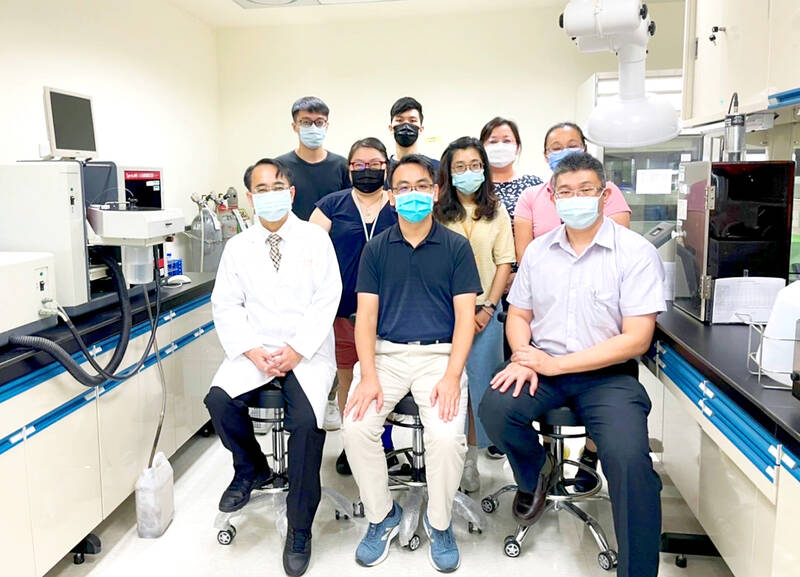Taiwanese scientists have invented a nanocomposite membrane-based sensor that can test for lead poisoning with a drop of blood in less than 10 minutes, achieving a major medical technology breakthrough.
The program to develop a faster, cheaper and easier-to-operate sensing device for lead poisoning is a collaboration between Chang Gung University, Linkou Chang Gung Memorial Hospital, and the National Taipei University of Science and Technology, the research team said in a statement yesterday.
Conventional tests for lead poisoning are highly accurate, but conducted only at specialist laboratories far removed from hospitals, with a delay that could prove dangerous to the patient, the statement said.

Photo courtesy of Linkou Chang Gung Memorial Hospital
When nanorods collide with ionized lead, surface tension causes the membrane to deform and change the electric resistance in the semiconductor, enabling the device to detect lead, hospital nephrologist Yen Tzung-hai (顏宗海) said.
The sensor’s detection limit is 0.12 parts per billion of lead, or seven times that of nanorods alone, he said.
The research team’s novel single-use test kits offer a highly sensitive, portable and low-cost capability that could be deployed at the point of care, while cutting down risks of contamination to the sample in transport, he said.
Taiwan banned the use of leaded gasoline in 2000, but clinical cases of lead poisoning persists due to exposure to the element in industrial settings, lead pipes, paints, ceramics, toys or consumption of medicinal herbs, he said.
Lead poisoning is difficult to diagnose because the metal can inflict harm on every organ and cause symptoms that include anemia, abdominal pain, cardiovascular disease, renal damage and infertility, Yen said.
The international standard for lead poisoning in adults is a blood lead concentration higher than 10 parts per billion and 3.5 parts per billion in minors, he said, adding that atomic absorption or plasma mass spectroscopy have been the only practical methods for detecting poisoning.
The team’s invention would increase health outcomes for patients and greatly improve medical efficiency, he said.

The manufacture of the remaining 28 M1A2T Abrams tanks Taiwan purchased from the US has recently been completed, and they are expected to be delivered within the next one to two months, a source said yesterday. The Ministry of National Defense is arranging cargo ships to transport the tanks to Taiwan as soon as possible, said the source, who is familiar with the matter. The estimated arrival time ranges from late this month to early next month, the source said. The 28 Abrams tanks make up the third and final batch of a total of 108 tanks, valued at about NT$40.5 billion

Two Taiwanese prosecutors were questioned by Chinese security personnel at their hotel during a trip to China’s Henan Province this month, the Mainland Affairs Council (MAC) said yesterday. The officers had personal information on the prosecutors, including “when they were assigned to their posts, their work locations and job titles,” MAC Deputy Minister and spokesman Liang Wen-chieh (梁文傑) said. On top of asking about their agencies and positions, the officers also questioned the prosecutors about the Cross-Strait Joint Crime-Fighting and Judicial Mutual Assistance Agreement, a pact that serves as the framework for Taiwan-China cooperation on combating crime and providing judicial assistance, Liang

A group from the Taiwanese Designers in Australia association yesterday represented Taiwan at the Midsumma Pride March in Melbourne. The march, held in the St. Kilda suburb, is the city’s largest LGBTQIA+ parade and the flagship event of the annual Midsumma Festival. It attracted more than 45,000 spectators who supported the 400 groups and 10,000 marchers that participated this year, the association said. Taiwanese Designers said they organized a team to march for Taiwan this year, joining politicians, government agencies, professionals and community organizations in showing support for LGBTQIA+ people and diverse communities. As the first country in Asia to legalize same-sex

MOTIVES QUESTIONED The PLA considers Xi’s policies toward Taiwan to be driven by personal considerations rather than military assessment, the Epoch Times reports Chinese President Xi Jinping’s (習近平) latest purge of the Chinese People’s Liberation Army (PLA) leadership might have been prompted by the military’s opposition to plans of invading Taiwan, the Epoch Times said. The Chinese military opposes waging war against Taiwan by a large consensus, putting it at odds with Xi’s vision, the Falun Gong-affiliated daily said in a report on Thursday, citing anonymous sources with insight into the PLA’s inner workings. The opposition is not the opinion of a few generals, but a widely shared view among the PLA cadre, the Epoch Times cited them as saying. “Chinese forces know full well that